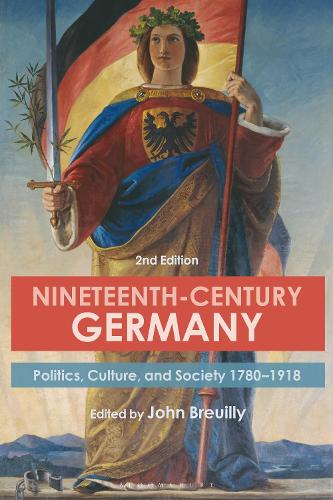
Nineteenth-Century Germany: Politics, Culture, and Society 1780-1918
(Paperback, 2nd edition)
Publishing Details
Nineteenth-Century Germany: Politics, Culture, and Society 1780-1918
By (Author) Professor John Breuilly
Bloomsbury Publishing PLC
Bloomsbury Academic
31st October 2019
2nd edition
United Kingdom
Classifications
Tertiary Education
Non Fiction
943.07
Physical Properties
Paperback
408
Width 158mm, Height 232mm, Spine 24mm
620g
Description
John Breuilly brings together a distinguished group of international scholars to examine Germanys history from 1780 to 1918, featuring chapters on economic, demographic and social as well as cultural and intellectual history. There are also chapters on political and military history covering the revolutionary and Napoleonic wars, the post-Napoleonic period, the revolutions of 1848-1849, the unification of Germany, Bismarckian Germany and Wilhelmine Germany, and Germany during the First World War. This new edition, which retains the helpful further reading suggestions for each chapter and a chronology, has been completely updated to take account of recent historiography. The statistical data has been expanded, more maps and images have been introduced, and there are two new chapters on transnational approaches and gender history. Finally, the editor has added a conclusion which reflects on the key developments in the history of Germany over the long nineteenth century. Providing clear surveys of the central events and developments and addressing major debates amongst historians, Nineteenth-Century Germany is vital reading for all those wishing to understand this crucial period in modern German history.
Reviews
Over the course of the 19th century, the Germans forged a nation. Yet building the nation state was only one part of a process of reorganizing society and reconnecting people nationally and trans-nationally. With great conceptual clarity and a wealth of information, this book charts how the Germans made sense of the modern world that emerged around them. * Benjamin Ziemann, Professor of Modern German History, University of Sheffield, UK *
This sparkling collection of essays has a distinguished pedigree, and now it has been thoroughly updated with new authors and new ideas. All chapters address compelling debates about the transformations of German life from the French Revolution to the First World War, putting the lie to lamentations that the 19th century is somehow vanishing from writing on German and European history. Breuillys conclusion challenges readers to reconsider the social, economic, cultural and political changes that made Germany into one of the most modernand restlessnations on earth. * James Retallack, Professor of History and German Studies, University of Toronto, Canada *
Author Bio
John Breuilly is Emeritus Professor of Nationalism and Ethnicity at the London School of Economics, UK. His books include Nationalism and the State (2nd Ed., 1993), The Formation of the First German Nation-State, 1800-1871 (1996), Austria, Prussia and The Making of Germany: 1806-1871 (2nd Ed., 2011). He is also the editor of The Oxford Handbook of the History of Nationalism (2013).
